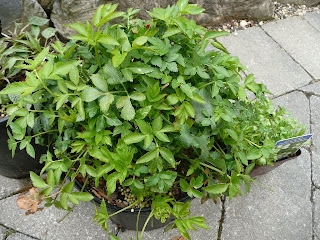
I was delighted to re-read Second Nature: A Gardener’s Education for the March selection of the Garden Bloggers’ Book Club. (Thanks Carol, over at May Dreams Garden). I read Second Nature for the first time back in the early 1990’s. I loved it, bought several copies for gifts over the years and had to buy a paperback copy for this month’s read. It was well worth it. The book has held up over time and continues to offer thoughtful observations.
Pollan writes of his development as a gardener. He also writes about why we find gardening so compelling an activity. I enjoyed re-reading tales of his grandfather’s great success as a gardener and his father’s near contempt of anything outdoors. His struggles to “control” animal behavior in and around his garden were hugely entertaining. But these tales are not at the heart of my current admiration for the book. What caused me pause this time around, was the chapter titled “The Idea of a Garden” where he tries to give shape to a garden ethic, one that helps us understand why we garden and what is our relationship to nature. Here, the mature thoughts of a man who has spent a lifetime in gardens AND libraries, are revealed to be unsentimental and basic in a way that says “this is the way it is”. Pollan’s garden ethic in part declares:
That nature is local. The gardener needs to understand this fact if he is going to successfully compete with nature which could care less whether human beings exist or not.
The garden ethic is anthropocentric – as humans, we probably can’t move beyond that bias.
As Pollan writes succinctly “The gardener learns to play the hand he’s dealt”.
The gardener has a running battle with nature that he probably can’t and perhaps shouldn't win. (no need to kill all the bugs after all)
The garden ethic is not only about humans vs. nature. Culture also adds influences on how humans interact with nature.
Success is never guaranteed.
Pollan uses the Cathedral Pines restoration story as an example of the wilderness ethic (Nature Conservancy) colliding with municipal interests. He suggests that a garden ethic approach might have resulted in a better result. (It's a long discussion, read it to see what he is talking about. It does get at the difficulties inherent in a restoration/recovery project.)
Second Nature by Michael Pollan is high on my recommended list. In fact, all his books are terrific. I am waiting for the next one!


























